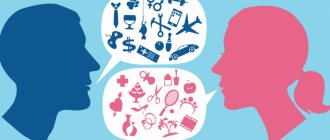Self-knowledge
The process of knowing yourself is called self-knowledge. It is formed throughout life, transforming depending on circumstances. A person’s self-knowledge is influenced by various factors, such as a person’s social status, his social roles, character and temperament, creative and physical abilities, and much more.
Personality formation occurs throughout life. A person is born, begins to explore the outside world and comes to realize himself as a separate person. In infancy, the child becomes aware of and accepts himself through his mother. Subsequently, he begins to understand that he is a separate person from her, begins to learn to accept and study himself, his body, behavior, and the reaction of others to him.
Psychologists argue that the influence of various factors on the process of self-knowledge is irreversible. Therefore, the more positive examples a child sees in childhood, the more thorough the process of self-knowledge will take place in his life.
Psychological dependence on various circumstances may also be associated with some difficulties in childhood.
With the process of personality formation, a person begins to understand what surrounds him, what reality he is in, how society influences him and how he himself influences social processes.
Getting to know ourselves from scratch or the path to self-knowledge
Psychology includes the whole “I am the concept”, which includes self-knowledge. Her main goal was to create her own image, a self-image. This concept answers the questions: “Who am I?”, “What am I like?”
The concept is especially interesting because it takes into account one’s behavior from the outside not only in real situations and settings, but also in fictional, even fantastic variations. That is, a person can well imagine his own reaction in response to what is happening. Also, the theory of one’s own “I” includes value judgments of one’s own behavior and reactions during various life situations.
Since the “I am concept” is different for everyone, not all people around will be able to accept it. This happens because in our thoughts we create one image of behavior, but in reality it may turn out to be completely different. In this case, it is important to understand the adequacy of the concept of one’s “I”. As you can already guess, an adequate version is one that completely corresponds to reality, an inadequate version, on the contrary, contradicts it.
In any case, a truly correct idea of oneself is possible only through self-knowledge. Without it, it is impossible to form an accurate picture and opinion about yourself.
Components of self-knowledge in psychology
Self-knowledge in psychology has its own components that should be relied upon in the process of self-actualization.
The main components of self-knowledge in psychology are identified:
1. Awareness of identity.
As a rule, it occurs in infancy, when the child learns to recognize sensations coming from the body and from external sources.
2. Acceptance of your “I”.
Perhaps from early childhood, as soon as the baby begins to consciously use pronouns such as “I”, “Me”, etc. in his speech.
3. Understanding the characteristics of the psyche.
This component is important in self-observation. Even in childhood, an individual notices mental properties that relate to him and begins to use them.
4. Self-esteem.
The most difficult, but no less important component of self-knowledge. Its formation in most cases begins in adolescence or adolescence, when the individual enters into closer communication with the social environment.
Self-knowledge and personality development
In order for a person to realize himself in life, it is very important to realize his purpose and place. Personal self-knowledge provides a person with potential success. His self-realization and future activities depend on how deeply he knows himself.
People who cannot find their place in life are usually very critical, distrustful and picky. In order to learn to look at the world realistically, you must first learn to see yourself. To achieve maximum opportunities in his life, a person must know himself.
Self-knowledge and self-development are inextricably linked. As a person develops, he comes to know himself. By getting to know oneself, a person develops. These two factors always go hand in hand. It is impossible to develop without knowing your preferences, capabilities, and talents. Self-knowledge of a person forms a certain range of interests and possible areas of human activity.
Many people already know in childhood what they want to become when they grow up. This process of self-discovery is not available to everyone. Scientists still cannot answer the question of why some children are confident in their future, while others are not. Perhaps the parents' potential and their positive attitude play a role. The process of self-knowledge greatly depends on the upbringing of a child.
Some psychologists argue that the process of self-knowledge is shaped by a person's ability to develop as a person. A number of factors influencing this process determine the success of personality development; by recognizing one’s inner world, temperament, becoming familiar with one’s distinctive features and capabilities, a person begins to accept himself as he is. This has a big role in the process of self-realization.
Depending on the type and way of thinking, a person receives a certain number of qualities that he will possess in life. Self-development will also depend on this. In addition, self-confidence plays a big role here. A complex person will be less in demand in society, despite his skills and talents. He will not be able to express himself the way he himself would like. Therefore, the processes of self-realization and self-knowledge are also interconnected.
Self-knowledge and self-development are not only interconnected, they complement each other. Development and progress are impossible if you are not aware of your belonging, distinctive features and qualities. A person develops by learning new things about himself, thereby using his new qualities to his advantage. In the process of self-discovery, people begin to realize their importance, thereby receiving more opportunities for development. A person who develops, grows above himself, becomes wiser, more experienced and more in demand in any field.
Personality orientation in the works of C. Rogers
Rogers is considered one of the best psychologists of the last century, he founded the psychology of humanism. His concept is based on the individual’s desire for actualization; he identifies the following concepts:
- “Real Self” - includes a person’s awareness of thoughts, values, and attitudes in life.
- “Ideal Self” is a set of ideas about how a person sees his future, what he strives for, and his life experience.
- “Social environment” - includes values and norms, behavioral characteristics inherent in a person’s social environment.
If there are discrepancies in life between the real and ideal state of a person and his implementation in society, mental disorders, neuroses, anxiety, and poor adaptation in society arise. To be in harmony with your Self and achieve an ideal state, you need to gain freedom, learn to listen to your inner voice, and act based on your experience and understanding of life.
Usually, problems arise in a situation where a person lives according to the rules of society, trying not to stand out from the crowd, forgetting about the “Ideal Self”. Rogers, working as a psychotherapist, believed that his task was to reveal the potential of the individual, to help determine and gain freedom through self-knowledge.
His “theory” found its application in pedagogy.
Key rules in the work of a teacher
- pedagogy should contribute to the formation of a healthy and adequate personality, promote personal growth;
- the source of development and growth lies in the person himself, only through comprehension and personal experience, responsible choice is it possible to learn and self-improvement of the individual;
- personal growth and development is impossible without understanding and accepting one’s essence. Respect for yourself and your inner world allows you to take risks and reveal new facets of your personality.
Rogers assumed that self-knowledge and self-development of students would be important components of the pedagogical process. The ideas of this psychiatrist will also be useful to parents in the process of raising a holistic and healthy personality.
Basic qualities of a teacher
- Trusting relationship;
- Stimulate students' internal motivation;
- Share experience, provide assistance in difficult situations;
- Be sensitive to the child’s emotions and feelings;
- Be active in relationships, express your emotions and experiences;
- Understand and know yourself.
Of course, teachers are not always able to find time for each student and promote the full disclosure and development of their personality, so this question applies more to parents, who must know and understand their child and help him develop. Each person in the process of his life asks questions of finding himself, his purpose, which is important for further development and self-improvement. “Know yourself and you will know the world,” the sages said.
Types of self-knowledge
The formation of personality undergoes changes throughout a person’s life. There are several types of self-knowledge that play a huge role in interpersonal and intrapersonal interaction. Types of self-knowledge differ depending on personal processes. The order of these processes is determined by various factors: analysis of one’s own self, acceptance of oneself as an individual, assessment of one’s capabilities and abilities.
Knowing some basics of his behavior and the behavior of others, it will be easier for a person to develop, since he will understand many behavioral points. There are a number of ways to help you engage in self-knowledge consciously.
- Introspection. A person deliberately fixes his view on behavior, observes his own reactions to various events, tracks his views and their dependence on various factors. As a result of analyzing one’s own personality, a person receives a holistic view of the world and compares it with his own feelings.
- Introspection. This process is closely related to self-observation. After analyzing some points, you can really assess your capabilities and behavioral reactions that arise in the processes of reaction to various factors.
- Comparing yourself with other people. By comparing your own behavior and the behavior of people around you, you can soberly assess many situations and work to correct your own mistakes. This process will definitely be the result of successful cooperation. After carefully studying your own reactions and the reactions of others, you can learn to interact successfully with them.
- Personality modeling. Using your own knowledge about personality, you can control and regulate many psychological reactions. Understanding the importance of self-control, a number of ideas about one’s own personality and the world around them are formed.
In the process of self-knowledge, a person begins to realize his essence, belonging and the meaning of his own existence. The result of self-knowledge is acceptance of oneself as an individual and the ability to find positive traits even in one’s shortcomings.
In addition to the fact that there are methods of self-knowledge, there are also means of self-knowledge with the help of which a person can more easily go through the path of self-recognition.
- Report to yourself. It consists of a written or oral daily report about the day passed, what was seen during the day, and one’s behavior. Even small moments must be recorded. Currently, blogs that are maintained on the Internet are very popular. They can record all the events that happened during the day. If a person does not want to flaunt his life, you can use a diary, which will record important events that happen in life.
- Psychological literature and cinema. There are a lot of useful documentaries about self-knowledge, as well as professional literature, with the help of which it will be easier to understand your worldview and accept yourself as an individual. By comparing yourself with movie characters or book characters, you can gain new knowledge about yourself.
- Psychological tests. They help people choose the direction of their talents, highlight their temperament and obvious character traits. With their help, you can understand your belonging to a particular profession or your inclination towards a particular activity. Many companies offer to take not only professional tests, but also tests to study self-realization and personal growth. It will be much easier for a trained person to deal with different situations by first studying similar works.
In addition, you can always turn to a psychologist who, using special methods, will help each person gain knowledge about himself, help set priorities and determine the functions of self-knowledge for each person. Psychological counseling is very developed in most European countries. In Russia, psychological counseling centers have also recently begun to develop extensively, where everyone can get answers to their questions, including advice on self-knowledge.
Trainings are conducted both individually and in groups. Depending on the wishes and capabilities of the person, you can choose the appropriate method for yourself. Not all people can cope with this issue on their own, so they often seek advice from a specialist. The right solution to a problem cannot always be found on your own, so there is nothing special about getting help from a specialist.
What methods of self-knowledge exist and how to apply them
Self-discovery is a lifelong process. Therefore, it is important to learn to enjoy it yourself. And having realized who you are and where you are going, you need to continue to rethink and improve your knowledge about yourself and the world. In this article we will look at several methods of self-knowledge, describe their advantages and show how to apply them.
Self-knowledge is the study by an individual of his mental and physical characteristics, comprehension of himself. It is formed gradually as we learn about the world around us and our own personality. This is a very slow, but at the same time exciting process. At some stage, a person may realize that he was mistaken about himself and rethink, clarify his values and goals. This is also part of the job and should be treated with understanding.
Why do you need to know yourself at all?
The short answer is that self-knowledge will allow a person to find happiness and peace of mind. It’s sad when a person spends several decades doing something, and then realizes that he wasted his time and that he was actually interested in completely different things. But if these regrets are not uttered on your deathbed, then there is time to make things right.
If you answer in more detail, this gives the ability for self-improvement, personal growth and self-actualization. A person who is at arm's length from understanding himself feels the fullness of life and realizes its meaning. We talk about arm's length because, as stated in the first paragraph, this process lasts a lifetime. And there is no problem with that. We can be in an eternal search and at the same time feel the world as it is, enjoy every moment of our life.
Well, in the end, when you understand who you really are, there are no deep and painful conflicts within you. Household problems will arise every day, but you will cope with them because you have resolved the main ones. You will take actions only because you clearly know that they fully fit into your system of values and self-understanding. You will not take meaningless actions and be in unconscious states when a variety of situations lead you, and you do not manage your life yourself.
The prospect is tempting, and every person understands that he needs to strive for this. He feels he needs it. Let's look at effective ways of self-knowledge and learn how to use them.
Ways of self-knowledge
Before we begin to analyze the tools, it is worth saying that by using them, you can learn not the most pleasant things about yourself. Therefore, be prepared in advance to evaluate yourself objectively. If it helps, imagine that you are evaluating a complete stranger to eliminate increased emotionality and self-flagellation.
1
Introspection
This is the first step on the path to self-knowledge. As has already been said, you must evaluate yourself completely objectively. You observe yourself, your behavior and your reactions to external stimuli. Self-observation involves constantly increasing your level of awareness.
There are several ways. For example, you could hang sticky notes above your desk (or wherever you spend the most time) with questions like these:
- What am I doing now and why?
- What am I thinking about now?
- How do I feel now? What can you call this feeling or sensation?
- What makes me feel alive and real?
- When do I act hypocritically?
You should focus on five points: feelings, sensations, thoughts, images and actions. Remember that you should not judge yourself, you are only getting to know yourself. You need to see the real picture, not the one you want. If you often feel insecure, admit it. Remember that this prevents you from achieving understanding of yourself and your goals.
You can write down everything you are doing now or have done today. If possible, you should keep such records at least once every 2-3 hours. After some time, you will realize that you are monitoring your emotions and actions and are no longer reacting on autopilot. This is a sign that the first step has been completed successfully. However, it is worth returning to again and again, as over time you will change or gain a deeper understanding of your motives and values.
2
Introspection
You are now ready to analyze your observations. With this method, you begin to reflect more on your behavior and reactions. You see the consequences of actions and try to determine their causes. This stage is very important and psychologically difficult. You may realize that more than half of your reactions come from childhood and also from your subconscious.
And you have a serious choice - to do it yourself or turn to a specialist. If you feel like you can handle it yourself, start taking notes.
Focus on the negative emotions and thoughts that arise day after day. This may include resentment, a desire to criticize others and people’s rejection of this, increased irritability, anger and apathy. If you, for example, dealt with your grievances, this will greatly change both your understanding of yourself and your life. Surely there were periods when you were not offended by anyone and you were in a great mood, and on other days it was the other way around. Want to know why? You will realize how much better you will feel and understand yourself if you learn not to be offended by the words and actions of other people.
Most of us simply do not have sufficient experience and knowledge to correctly assess our personality. Therefore, we recommend that you read more books on this topic. In addition to giving you a framework for assessing your personality, they often contain a list of questions whose answers will help you get to know yourself better.
3
Comparison
People love comparisons by nature. Both comparing oneself with others and categories (“best” - “worst”). But this can either hinder you from getting to know you or help you.
Comparing yourself to other people is not an unambiguous evil. If this leaves you feeling frustrated, worthless and jealous, then yes, you need to change your ways. If comparison with other people inspires you and forces you to become even better, then you are doing everything right. As has been said, self-knowledge helps you determine who you really are. However, this does not mean that you do not need to develop and become better. The biography of a successful person will help you understand and perhaps even identify hidden talents and resources in yourself that you were not aware of.
Comparing categories is likely to lead to bad consequences. By calling one person lazy and another hardworking, you impair communication and criticism, which can result in internal conflicts. After all, by such standards, you are lazy if you wake up in the morning and don’t want to get to work. This leads to unnecessary stress and the development of complexes.
So we can give you two pieces of advice. First: comparing yourself to other people is good if you do it in the right way and are inspired by other people's actions. Second: since comparison by categories is sometimes unavoidable, use all points of view, or at least do not judge yourself or other people. If your friend cannot get down to work, this does not mean that he is lazy. Just like in your case.
4
Self-acceptance
At this stage, you accept yourself for who you are. This does not mean that you should be content with this, because self-development is necessary for any person. But now you know what to start from. You understand what your weaknesses and strengths, aspirations and motivations, values and goals are. It's also important to look for strengths in your weaknesses because it makes them less painful to perceive.
At this stage, you cannot do without self-testing, because you can be wrong about yourself, and besides, you are constantly changing. Therefore, you should not be satisfied with the picture that you have. Develop, change, but constantly watch yourself and try to understand yourself and the changes that are happening inside you.
In conclusion, I would like to advise you to study psychology, in particular such sections as social psychology and personality psychology.
For a more detailed understanding of the topic, take a course on self-knowledge, which will help you analyze more than 50 characteristics of your personality and learn how to apply this knowledge in life.
We wish you good luck!
We also recommend reading:
- Storytelling
- Self-reflection
- How to stop being a victim
- Personal Effectiveness with the Why Habit
- Self-development methods
- Formation of correct self-esteem
- Great ways to waste time
- How to make a good first impression
- Exercises for self-knowledge
- Definition of values
- Formation of self-awareness
Key words:1Self-knowledge
Primary self-knowledge
The process of self-discovery begins in infancy. Throughout life, it changes and takes on more and more defined forms. Primary self-knowledge begins to develop in early childhood. Trust in the world and in oneself depends on it.
The very first stage in self-knowledge is primary. The child forms an idea of himself and other people, begins to explore the world, gets acquainted with the reactions of people and with his own. The process of self-knowledge is embedded in the brain. From birth, a person begins to learn to accept himself as he is.
Thanks to properly organized help from parents, the process of primary self-knowledge will be easier. Due to the great influence of parents on their child, part of his ideas about himself and the world around him will be inextricably linked with the parents’ idea of him. As a result of praise or, conversely, conflicts emerging in the family, the child begins to know himself and learns to accept the world.
Despite the fact that primary self-knowledge begins at an early age, the crisis of this stage occurs in more mature years. When encountering any obstacles along the way, a discrepancy with one’s expectations, the changed world begins to seem different from what it was in early childhood. Teenagers often tend to idealize the surrounding reality, however, at some point a crisis occurs. This is called a crisis of primary self-knowledge, when one’s own ideas began to undergo some changes that must be come to terms with.
Methods and techniques of self-knowledge
The process of self-knowledge is carried out using the following means.
- Self-report. For example, keeping a diary recording changes.
- Familiarization with films and literature that contain images with which you can compare yourself, developing your own spirituality.
- Studying the basics of psychology, both personal and social, becoming familiar with screening tests. A scientific approach will lead to literacy and a correct assessment of personal growth.
- Psychological consultation with specialists will help identify errors and solve problems.
- Activities related to training in psychology provide incentive and help organize self-knowledge of the individual.
What does this give? The realization of the goal comes - achieving a state of happiness in everyday life. And also an understanding of your purpose. The process of self-knowledge, realized by special means, is the form in which the psychologist carries out his activities. 1. Private consultation. In this case, an individual plan is drawn up for the client. And the latter gets the opportunity to open up to the maximum, understand the problems, and find resources to implement possible solutions. 2. Work with groups according to the type of psychological training. Relationships are built between members, in which the process of self-knowledge and studying the psychology of others becomes intense.
A person's exploration of himself begins from the moment he discovers differences with other people. Examples of individual characteristics are character, behavioral factors, chosen life goals. At what period do you need to choose a path of self-knowledge separate from others in order to move along it? It is necessary to go through the stages of introspection, comparison and personality modeling. After which you should combine the antipodes with negative and positive aspects and get to know other people, having the ability to compare and evaluate.
The stages will help you discover new things in yourself and strengthen your self-esteem. Having chosen methods of self-knowledge, we have the opportunity to use the means by which:
- the improvement of spirituality and inner “I” continues;
- self-test is implemented;
- the importance of such activities is realized.
The path of self-discovery involves the use of various techniques, applied in the form of stages or theories. Let's list some of them.
Personal growth
This concept is considered a stage or a necessary process. Many comprehend the inner world, acquire spirituality through religion, unity with the Divine. This method involves humility, studying the rules of life according to the sacred scriptures: the Bible, the Koran, and other sources. Self-knowledge and self-development of the individual becomes a paramount task. Spiritual books lay out in very simple language the ways of finding your destiny. Written thousands of years ago, they are still very relevant today.
Judgments of self-knowledge here reflect:
- desire to be healthy;
- capability development;
- unification of nature and spirit.
These aspects are combined into a single whole during the narrative. From birth, children fill their psyche with everything they see, learn and acquire the ability to distinguish themselves from others. Worldview is formed from the age of three, after which the stages of self-knowledge are realized in the form of the emergence of character with principles. And then a culture of behavior is developed. Feelings, analytical thinking, awareness of the environment and events appear. This list of steps is called personal growth.
Self-concept
A system of methods called esoteric involves the formation of a triple “I”. The peculiarities of self-knowledge in this case lie in the reflection of these unique images that make up the personality, interpreting the concepts of thoughts, dreams, aspirations for the ideal. Self-concept (or “I” - concept) preaches nepotism, culture in behavior and universal values in self-knowledge.
When expressing the soul (“I”) in the material world, the goal is to create an ideal person. Self-knowledge is aimed at achieving this. Disadvantages are neutralized in favor of the comprehensive development of the worldview. Although the fight against them continues. Motivation appears. Some specific personality is used as a standard. Such methods of self-knowledge involve erasing the line between oneself and a given ideal. Universal human values in this case presuppose finding one’s purpose while realizing one’s uniqueness. Evaluations and control in relation to oneself exclude a position below others. Social weight and self-esteem will increase as you approach the ideal.
Time stages
The peculiarities of self-knowledge in the method of applying time stages are to reflect the essence of the individual in relation to different periods. A person is determined in life and feels like a part of the planet. Self-knowledge and self-development of the individual involves going through the following stages.
Conflict with primary self-knowledge
As a result of understanding themselves and the surrounding reality, people usually identify certain factors that subsequently have a great influence on their lives. For example, the attitude of other people towards him is usually of great importance for an individual. The general impression of oneself is formed, among other things, through the views of others on one’s personality.
Methods of self-knowledge involve studying one’s own “I” through the eyes of others. Possessing certain information from other people, a person receives a lot of useful information about his personality, and also forms his own opinion about the reality around him.
A person does not always hear and see what he would like. Therefore, a conflict with primary self-knowledge often arises at this post. People tend to note only positive qualities in themselves, forgetting about some negative aspects.
Basics of self-development and characteristics
The basics of self-development presuppose that a person has the ability to shape his life and achieve his tasks and goals. In addition to activity, this process is also influenced by human activity. He can be socially active (initiative, executive) or socially reactive (impulsive, passive). Social activity goes through the following development paths:
- Standard level : schoolchildren, imitation, repetition of actions.
- Normative-personal - the teenage period, one’s own outlook on life and attitude to certain issues appears.
- Personally productive, productive and creative - an adult who makes a contribution to social life, creates innovations, modernizes the old, introduces elements of creativity into the process of life.
Indispensable conditions for self-development are initiative, and later - consciousness and independence. Social activity contributes to the development of abilities to make one’s own choice of development paths along the path of life, and responsibility for one’s actions appears. Development is impossible without achieving the necessary level of self-awareness, understanding and analysis of one’s personality.
The foundations of self-development directly depend on a person’s inner world and his analysis of real life and the situation at a given stage. The inner world is unique and is partly a reflection of the outer world. There are also suggestions that it develops throughout life, together with the personality itself, under the influence of the surrounding reality.
There are several stages of self-development
- revitalization (the child learns to communicate, understand his individuality),
- animation (the child masters the outside world),
- personalization (learning the rules, norms of life with mentors and understanding one’s role in creating a life story),
- individualization (in the process of communication, an idea of one’s personality is formed, characteristics are revealed, and the need for introspection and responsibility for oneself arises),
- universalization (a person goes beyond his individuality, unity with superhuman values, faith or spirituality appears).
The foundations of self-development lie in a person’s desire for self-improvement, improving his self throughout his life.
Secondary self-knowledge
The goal of self-knowledge is an in-depth study of one’s own characteristics and using them to one’s own advantage. As a result of the formation of personality, it undergoes some changes, thanks to many factors influencing a person’s life.
Over time, an individual may lose some of his qualities and acquire others. As a result of this process, a partial erasure of ideas about one’s own “I” begins. By undergoing these changes, a person becomes forced to accept the “new” self. After some time, self-acceptance begins through the eyes of others. Very often people see themselves differently from the way their friends and relatives see them. This is also part of self-knowledge. Accepting oneself from different positions plays a huge role in the process of personality development.
In the process of personality formation, there comes a moment when a person seems to know himself and his own reactions to something very well. This period is called secondary self-knowledge. It is formed after a successfully passed crisis of primary self-knowledge. A person begins to realize his own independence, the importance of his judgments and the reaction of others to them.
In order to successfully pass this stage, you only need to be attentive to your own personality while choosing especially important moments.
What is self-knowledge?
Self-knowledge is the constant science of studying one's body and spirit - physical and moral capabilities, understanding one's own personality, lasting a lifetime - this is what distinguishes us from animals. All questions related to you - why I live, what I can do, what is the ideal job for me, the right world and the loved one are the means of human self-knowledge. It is very important to develop the body on a physical and spiritual level. Modern people have ceased to be interested in the inner world, which makes the world more stingy and commercial. But the individual is a spiritual being who has independently descended to materialism. The stages of self-discovery are designed to develop the spirit and realize that not everything can be bought with money.
As we grow older, we discover new possibilities in ourselves, making our dreams come true. The psyche develops, the circle of communication expands, the concept of self-esteem appears, with which self-knowledge is directly related. Personal self-esteem consists of three elements:
- Self-awareness.
- Weight gain in society.
- Holding the bar and constantly checking yourself.
Self-esteem depends on a person’s satisfaction with himself - an adequate status is proportional to your capabilities. Try not to fly in the clouds and not mix yourself with dirt. Remember: you are no better or worse than anyone else. If everything is bad and it’s hard for you to call yourself a good character, get busy and achieve success. Each of us has our own ideal, the main thing is not to deviate from it and strive to surpass it. Find motivation within yourself and never stop there. Behind a minor failure, a huge treasure can languish in prison.
conclusions
In conclusion, I would like to appeal to the reader - after reading this article, get up from your chair and start acting. Many people don’t know how to find their purpose, spending days and days wasting their lives. If you want to achieve a little more than eternal work in a factory or office and boring everyday life - take action now! Read books, travel, analyze yourself. Life is not given to throw resources into the void - a person must improve. Self-development and self-knowledge are the key to conquering the world, but many of us don’t think about it, drawing boundaries between work, home and store. Develop, explore the world, comprehend new areas of life, and one day you will become an ideal for many others.










